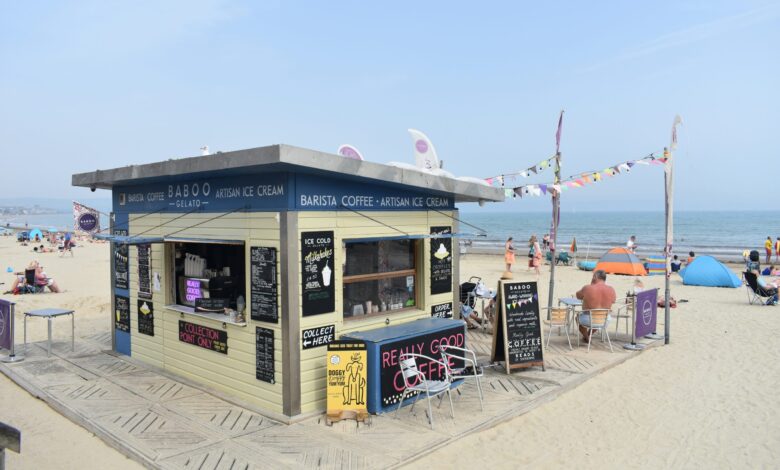Ebb and flow or terminal decline: the state of summer hospitality jobs
Hospitality businesses should be welcoming seasonal recruits at the height of summer. Instead, many are cutting back on roles as costs rise and policy changes bite. Can the Great British summer job be saved, or is it becoming a thing of the past?

Register to get 1 free article
Reveal the article below by registering for our email newsletter.
Want unlimited access? View Plans
Already have an account? Sign in
For generations, the “Great British summer job” has been a rite of passage. Students pulling pints in pub gardens, teenagers serving fish and chips on the pier, and young workers scooping ice creams at busy seaside resorts all became part of the seasonal rhythm of hospitality. These short-term roles give young people their first experience of responsibility, teamwork and financial independence.
But this summer, alarm bells are ringing. Industry leaders warn that the seasonal job market is under threat, with tens of thousands fewer opportunities on offer compared to recent years. UKHospitality (UKH) has raised the spectre of the summer job “dying out altogether,” following stark figures from the Recruitment and Employment Confederation (REC) that revealed a 25% year-on-year drop in postings for hospitality roles. That equates to 22,369 fewer vacancies than last summer.
The concern is not just about temporary staffing gaps. Neil Carberry, chief executive of the REC, described the shortfall as a “red flag for the wider economy,” pointing out that hospitality is one of the UK’s biggest entry points into work. Without those first rungs on the ladder, he warned, entire generations risk being shut out before they even get a foot in the door.
So is this the end of the summer job as we know it, or simply a tougher-than-usual year in a sector prone to peaks and troughs?
The figures are particularly striking given that domestic tourism is booming. Tourist spending on day visits in England rose by 6% in 2024, reaching £48.4bn, on top of a 15% increase the year before. In April alone, UK residents took 68.6 million trips within the country. That’s 10% more than in the same month in 2024.
Ordinarily, such a surge in demand would spark a scramble to recruit staff for hotels, restaurants and attractions. Yet the opposite is happening: hiring has slowed dramatically, coinciding with new cost burdens on employers.
UKHospitality has repeatedly highlighted the strain caused by changes to employer National Insurance contributions (NICs) announced in last year’s Budget. Combined with the phased reduction in business rates relief, the trade body says the measures have loaded £3.4bn of extra annual costs onto hospitality firms. Since then, the sector has shed an estimated 84,000 jobs. It’s little wonder, then, why teenagers and young adults aren’t being employed in this sector at the same rate as they have in previous years.
Allen Simpson, chief executive of UKH, warned that the implications extend beyond industry finances. “Unless the government acts, we could well be seeing the death of the great British summer job,” he said recently. “That’s not good for the economy, for businesses, or for the people that need this flexible work during the summer.”
For those running hospitality businesses, the pressure is very real. Steve Perez, founder and chief executive of Global Brands, argues that the timing of recent government measures has created what he calls a “perfect storm” for employers already stretched by the cost-of-living crisis. Increases to both the National Minimum Wage and employer National Insurance Contributions have landed just as business rates relief was reduced, forcing venues to absorb significant new expenses.
Perez notes that raising the minimum wage doesn’t just lift entry-level salaries; it pushes up pay across the board, as businesses must increase wages at every tier to attract staff and maintain progression routes. This, he says, comes with “a huge cost” before even accounting for the additional NIC burden.
But it is not just hospitality venues that he fears will suffer. Perez points out that the changes could hit younger workers hardest, with the new minimum wage structure narrowing the gap between under-21s and older recruits. Because 21-year-olds typically bring more experience than 18-year-olds fresh from education, he warns that employers may feel less inclined to invest in training younger staff.
“Ultimately, this will have a negative impact on the holiday job market, with fewer opportunities for 18–20-year-olds,” Perez explains. “The question then remains; how do these 18-year-olds find the jobs that will provide them with experience and training?”
He believes this is a predicament that requires urgent government attention, calling on the chancellor to take steps such as reducing VAT for hospitality venues to ease the financial strain and enable businesses to keep hiring younger workers.
Perez’s comments underline a dilemma at the heart of the debate: how to balance fair pay and sustainable staffing while still ensuring entry-level roles remain accessible.
The worry is whether this downturn is a temporary reflection of wider economic challenges, or the beginning of a structural shift away from seasonal hiring. Hospitality has long been vulnerable to fluctuations. Weather, exchange rates and disposable income all play a role in shaping demand. Some analysts argue that this year’s slump could simply be an outlier, a collision of rising costs and policy changes against a backdrop of otherwise strong consumer demand.
Others, however, fear that the cumulative effect of cost pressures, staff shortages and shifting worker expectations could spell the end of the traditional seasonal job model. Younger workers may be turning to gig economy roles that offer more flexibility, while employers increasingly prioritise experienced staff who can hit the ground running.
The decline in summer jobs carries implications well beyond the sector itself. For young people, these roles are often their first taste of working life, equipping them with skills and confidence that pay dividends long after the holidays end. Losing those opportunities risks leaving school-leavers and students without vital stepping stones into the workforce.
For businesses, meanwhile, seasonal staff are crucial to handling peak demand. Without them, pubs, hotels and tourist attractions face the prospect of reduced opening hours, longer queues and missed revenue opportunities at the very time of year when they should be thriving.
And for local economies, particularly in coastal towns and tourist hotspots, the ripple effect could be significant. Seasonal hiring has long provided a financial boost to communities where permanent employment options may be limited.
The solutions on the table vary. Industry leaders are calling on the government to take immediate steps to reduce the financial burden on employers, from cutting VAT for hospitality to rethinking business rates and reversing NIC increases. Others suggest more targeted measures to support youth employment, such as wage subsidies or training incentives for under-21s.
On the business side, some operators are experimenting with new approaches to recruitment and retention. These include offering clearer career progression pathways, bolstering staff wellbeing initiatives, and adjusting job roles to make seasonal work more appealing to younger applicants.
The coming months will reveal whether such efforts are enough to stem the decline. But as Perez and others argue, government intervention may prove decisive.
The debate over the fate of the Great British summer job reflects deeper tensions in the hospitality sector. On one hand, strong tourism demand suggests a vibrant market crying out for staff. On the other, escalating costs and policy pressures are making it harder for businesses to sustain the very roles that keep the industry moving.
As Carberry concludes, hospitality has always been one of the UK’s greatest entry points into work. The challenge now is ensuring it remains so for this generation, and the next.







